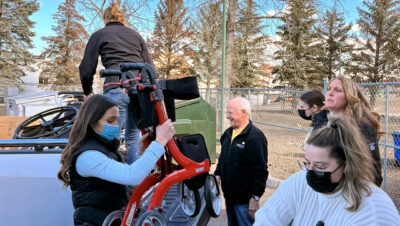U of L nursing students gain first-hand experience helping unhoused
By Alexandra Noad - Lethbridge Herald Local Journalism Initiative Reporter on July 5, 2024.
 U of L photo -
University of Lethbridge nursing students help unload medical supplies donated by Medical Mercy Canada.
U of L photo -
University of Lethbridge nursing students help unload medical supplies donated by Medical Mercy Canada.University of Lethbridge nursing students got first-hand experience helping the unhoused population through a partnership with the Lethbridge Wellness Shelter and Stabilization Unit.
Chloe Crosschild, assistant professor with the Faculty of Health Sciences in the nursing department, says the faculty saw the benefit for the students to see things in a different perspective.
“We saw that as a faculty, as an opportunity to really give students a different perspective with nursing care and the different types of population that they would be working with in their future careers,” said Crosschild.
The students spent January to April putting what they learned in theory into practice as part of their clinical practice for community health.
Crosschild says it helped the students see the importance of de-stigmatizing people who are actively using drugs.
“I think it provided them to really get that firsthand experience working with populations who are actively using substances, to then ask questions, to then sort of see what brought them to that point in time in their life, to better understand how it’s not an individual blame and shame approach or but rather to look at the systemic issues that are at play in our society,” said Crosschild.
A student-led project saw a need of medical supplies for the shelter to help prevent infections for the unhoused. They found Medical Mercy, a charity that sends medical supplies to international countries. When Medical Mercy realized these people needed help in their own backyard they were more than happy to provide monthly donations to the Lethbridge Shelter.
Crosschild says it was impressive to see the initiative the students took.
“I was very impressed with the work that went in with the three students that led that. They were able not just to get things like Band-Aids, but they also were able to acquire wheelchairs, walkers, crutches, medical boots, any kind of medical supply that you can think of,” said Crosschild.
The students talked about preventing infections from happening, which for the unhoused population can happen very quickly. These conversations made the partnership come alive.
The students learned the population they were working with were people with stories, but unfortunately were often let down by systemic issues. With the Blood Tribe taking ownership of the Wellness Centre in Lethbridge the students were also able to see how an Indigenous organization was able to help non-Indigenous populations that were also struggling with similar issues.
“This partnership was a bit different because the people that are accessing the leverage while in the shelter are not all Indigenous and so it did give them that ability to really reflect on how Indigenous organizations are also strengths based in their approach to working with varying diverse backgrounds of people,” said Crosschild.
Crosschild believes the clinical practice the students received will help them in their future careers no matter where they choose to practice.
“It definitely is something that they’re able to apply in all areas of their practice and so it was a it was a very beneficial partnership with the Department of Health to be able to afford the students that opportunity.”
15-14




